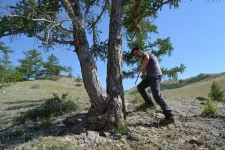(Press-News.org) Researchers have found that 2023 was the hottest summer in the Northern Hemisphere in the past two thousand years, almost four degrees warmer than the coldest summer during the same period.
Although 2023 has been reported as the hottest year on record, the instrumental evidence only reaches back as far as 1850 at best, and most records are limited to certain regions.
Now, by using past climate information from annually resolved tree rings over two millennia, scientists from the University of Cambridge and the Johannes Gutenberg University Mainz have shown how exceptional the summer of 2023 was.
Even allowing for natural climate variations over hundreds of years, 2023 was still the hottest summer since the height of the Roman Empire, exceeding the extremes of natural climate variability by half a degree Celsius.
“When you look at the long sweep of history, you can see just how dramatic recent global warming is,” said co-author Professor Ulf Büntgen, from Cambridge’s Department of Geography. “2023 was an exceptionally hot year, and this trend will continue unless we reduce greenhouse gas emissions dramatically.”
The results, reported in the journal Nature, also demonstrate that in the Northern Hemisphere, the 2015 Paris Agreement to limit warming to 1.5C above pre-industrial levels has already been breached.
Early instrumental temperature records, from 1850-1900, are sparse and inconsistent. The researchers compared early instrumental data with a large-scale tree ring dataset and found the 19th century temperature baseline used to contextualise global warming is several tenths of a degree Celsius colder than previously thought. By re-calibrating this baseline, the researchers calculated that summer 2023 conditions in the Northern Hemisphere were 2.07C warmer than mean summer temperatures between 1850 and 1900.
“Many of the conversations we have around global warming are tied to a baseline temperature from the mid-19th century, but why is this the baseline? What is normal, in the context of a constantly-changing climate, when we’ve only got 150 years of meteorological measurements?” said Büntgen. “Only when we look at climate reconstructions can we better account for natural variability and put recent anthropogenic climate change into context.”
Tree rings can provide that context, since they contain annually-resolved and absolutely-dated information about past summer temperatures. Using tree-ring chronologies allows researchers to look much further back in time without the uncertainty associated with some early instrumental measurements.
The available tree-ring data reveals that most of the cooler periods over the past 2000 years, such as the Little Antique Ice Age in the 6th century and the Little Ice Age in the early 19th century, followed large-sulphur-rich volcanic eruptions. These eruptions spew huge amounts of aerosols into the stratosphere, triggering rapid surface cooling. The coldest summer of the past two thousand years, in 536 CE, followed one such eruption, and was 3.93C colder than the summer of 2023.
Most of the warmer periods covered by the tree ring data can be attributed to the El Niño climate pattern, or El Niño-Southern Oscillation (ENSO). El Niño affects weather worldwide due to weakened trade winds in the Pacific Ocean and often results in warmer summers in the Northern Hemisphere. While El Niño events were first noted by fisherman in the 17th century, they can be observed in the tree ring data much further back in time.
However, over the past 60 years, global warming caused by greenhouse gas emissions are causing El Niño events to become stronger, resulting in hotter summers. The current El Niño event is expected to continue into early summer 2024, making it likely that this summer will break temperature records once again.
“It’s true that the climate is always changing, but the warming in 2023, caused by greenhouse gases, is additionally amplified by El Niño conditions, so we end up with longer and more severe heat waves and extended periods of drought,” said Professor Jan Esper, the lead author of the study from the Johannes Gutenberg University Mainz in Germany. “When you look at the big picture, it shows just how urgent it is that we reduce greenhouse gas emissions immediately.”
The researchers note that while their results are robust for the Northern Hemisphere, it is difficult to obtain global averages for the same period since data is sparse for the Southern Hemisphere. The Southern Hemisphere also responds differently to climate change, since it is far more ocean-covered than the Northern Hemisphere.
The research was supported in part by the European Research Council.
END
2023 was the hottest summer in two thousand years
2024-05-14
ELSE PRESS RELEASES FROM THIS DATE:
Analysis of previously unstudied areas of the human genome suggests people with more copies of ribosomal DNA have higher risks of developing disease
2024-05-14
UNDER STRICT EMBARGO UNTIL 4PM GMT (11AM ET) on 14 May 2024.
Peer reviewed | Observational | People
Ribosomal DNA (rDNA) is present in hundreds of copies in the genome, but has not previously been part of genetic analyses. A new study of 500,000 individuals indicates that people who have more copies of rDNA are more likely to develop inflammation and diseases during their lifetimes.
Standard genetic analysis techniques have not studied areas of the human genome that are repetitive, such as ribosomal ...
Study reveals mixed public opinion on polygenic embryo screening for IVF
2024-05-14
Three out of four U.S. adults support the use of emerging technologies that estimate a future child’s likelihood of developing health conditions influenced by multiple genes — such as diabetes, heart disease, and depression — before an embryo is implanted during in vitro fertilization (IVF), according to a new public opinion survey led by researchers at Harvard Medical School.
Results of the survey, to be published May 14 in JAMA Network Open, underscore the need for public education and conversation about the positive ...
Congenital anomalies are ten times more frequent in children with neurodevelopmental disorders
2024-05-14
Children with neurodevelopmental disorders report congenital abnormalities, such as defects of the heart and/or urinary tract, at least ten times more frequent compared to other children. This is one of the findings from an analysis from Radboud university medical center of data from over 50,000 children. Thanks to this new database, it's now much clearer which health problems are associated with a particular neurodevelopmental disorder and which are not. The study has been published in Nature Medicine.
Two to three percent of the population have a neurodevelopmental disorder, such as autism or intellectual ...
Does pharmacological treatment of ADHD reduce criminality?
2024-05-14
May 14 2024 – A study in the Journal of the American Academy of Child and Adolescent Psychiatry (JAACAP), published by Elsevier, found that pharmacological treatment of attention-deficit/hyperactivity disorder (ADHD) reduced violence- and public-order related crimes. However, it did not reduce other types of crimes, among patients with ADHD in early to late adolescence considered to be in the grey zone (or on the margin) for such treatment.
This study uses variation in healthcare providers treatment preference as the basis for a quasi-experimental design that examines the effect of pharmacological ...
WCM awarded grant to study RNA processing in prostate cancer
2024-05-14
A team led by Dr. Eddie Imada, assistant professor of research in pathology and laboratory medicine, has been awarded a three-year, $1.5 million United States Department of Defense grant for research on a cellular process called alternative polyadenylation and its role in prostate cancer.
The grant was awarded under DoD’s long-running Prostate Cancer Research Program, a Congressionally-directed medical research funding project aimed at improving prostate cancer prevention, detection and patient care. Thousands of current and former servicemen ...
Artificial intelligence tool to improve heart failure care
2024-05-14
UVA Health researchers have developed a powerful new risk assessment tool for predicting outcomes in heart failure patients. The researchers have made the tool publicly available for free to clinicians.
The new tool improves on existing risk assessment tools for heart failure by harnessing the power of machine learning (ML) and artificial intelligence (AI) to determine patient-specific risks of developing unfavorable outcomes with heart failure.
“Heart failure is a progressive condition that affects not only quality of life but quantity as well. All heart failure patients are not the same. Each patient ...
People without an inner voice have poorer verbal memory
2024-05-14
Previously, it was commonly assumed that having an inner voice had to be a human universal. But in recent years, researchers have become aware that not all people share this experience.
According to postdoc and linguist Johanne Nedergård from the University of Copenhagen, people describe the condition of living without an inner voice as time-consuming and difficult because they must spend time and effort translating their thoughts into words:
“Some say that they think in pictures and then translate the pictures into words when they need to say ...
Courtship through flute song in Indigenous Southern Plains culture #ASA186
2024-05-14
OTTAWA, Ontario, May 14, 2024 – Every love story is unique, and in traditional Indigenous Southern Plains culture, it begins with an original ballad performed on the flute. In order to win a lover’s affection, and respect among the tribe, each pursuer must compose one good flute serenade.
Paula Conlon, a former music professor at the University of Oklahoma, has researched the history and cultural significance of the Indigenous flute since the 1980s. Conlon will present her work Tuesday, May 14, at 9:45 a.m. EDT as part of a joint meeting of the Acoustical Society of America and the Canadian Acoustical ...
SwRI investigating unusual substorm in Earth’s magnetotail using MMS data
2024-05-14
SAN ANTONIO — May 14, 2024 —Southwest Research Institute is investigating an unusual event in the Earth’s magnetotail, the elongated portion of the planet’s magnetosphere trailing away from the Sun. Using data from NASA’s Magnetospheric Multiscale (MMS) mission, SwRI scientists are examining the nature of substorms, fleeting disturbances in the magnetotail that release energy and often cause aurorae.
Since their launch in 2015, the MMS spacecraft have been surveying the magnetopause, the boundary between the magnetosphere ...
Mislabelled shark meat rampant in Australian markets, study finds
2024-05-14
Researchers at Macquarie University have found a significant portion of shark meat sold in Australian fish markets and takeaway shops is mislabelled, including several samples from threatened species.
The findings, published in the journal Marine and Freshwater Research this month, highlight the ineffectiveness of seafood labelling and the grave implications for both consumer choice and shark conservation.
Researchers collected 91 samples of shark meat from 28 retailers across six Australian states and territories and used DNA ...






